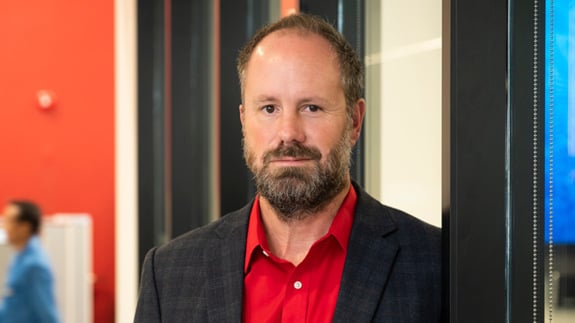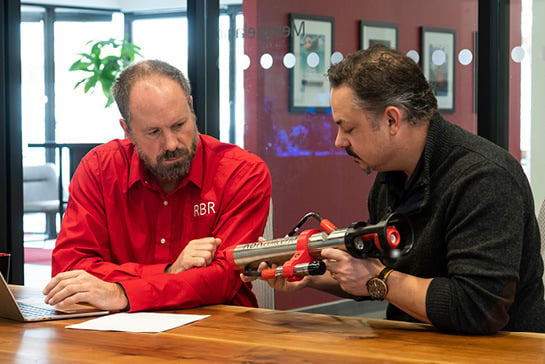Powering up at work: How this oceanographic instrument manufacturer promotes sustainable commuting

The team at RBR is all too familiar with the effects of climate change.
The Ottawa-based company designs, builds and deploys oceanographic instruments. Their products measure a wide range of water characteristics, giving the team first-hand insight into the acceleration of coastline erosion, changes in water temperature and impacts on marine ecosystems.
Greg Johnson, President of RBR, believes it’s important for the company to do everything it can to reduce its own environmental footprint.
When the company moved headquarters, it installed three electric vehicle (EV) chargers and offered free use to employees and members of the community. This is one of several incentives RBR has introduced to encourage staff to choose more sustainable commuting options.
Those incentives have helped more than just the environment. Johnson says they also offer business benefits, especially in staff recruitment and retention.
“Recruitment is diabolically difficult in today’s job market,” he says. “Anything you can do to attract candidates is valuable.”
Reducing the impact of driving is great, but what we really wanted to do was reduce the driving.
Greg Johnson
President, RBR
Promoting green transport to the workplace
Because RBR believes strongly in the importance of in-person teamwork, the company needed a way to make commuting as sustainable as possible. It had installed EV charging stations at its old headquarters, and Johnson was keen to continue providing that amenity when RBR moved facilities in 2020. While the new building had charging stations, these were run by a third party at prohibitive rates.
To better encourage the use of EVs, RBR installed three of its own stations. The company also doubled down on its commitment to EVs by offering employees a 10% subsidy to buy electric vehicles up to a maximum of $10,000.
“But that was just the beginning,” says Johnson. “Reducing the impact of driving is great, but what we really wanted to do was reduce the driving.”
To make that happen, RBR improved its bicycle parking infrastructure and launched a program to incentivize bicycle commuting, offering employees 50 cents for each kilometre they bike to and from work. For the winter months, the incentive is increased to one dollar per kilometre.
The company also offers fully subsidized public transit passes and gas gift cards for employees who choose to carpool.
The rewards have been worth it
Johnson says staff has responded very positively to these initiatives, with six employees taking advantage of the EV purchase subsidy over the past two years. All three chargers are usually full throughout the day, and employees have created a Slack channel devoted to managing and sharing their use.
The bike incentive program has also seen considerable uptake, with employees biking a total of 18,415 kilometres between May 1 and October 31, 2022. Based on an estimate of 200 grams of carbon dioxide per kilometre of car driving, these employees have avoided almost 3,700 kilograms of carbon emissions in just six months.
These initiatives have also supported RBR’s recruitment efforts. The company offers referral bonuses, and Johnson regularly hears employees mentioning the charging stations and commuting support when they’re encouraging friends to apply.
“You know you’re doing something right when employees are using it as a selling point to talk up your company,” he says.

Environmental initiatives are simpler than you think
Johnson says the installation of the charging stations was straightforward. The chargers themselves are standard Level 2 residential chargers readily available online. Installing them required some electrical work on the breaker panel, some digging to run the lines out to the parking area, and a certified installation of the chargers.
“The biggest hurdle a lot of companies seem to face is overthinking things,” says Johnson. “But it doesn’t have to be complicated. If you want to do something, do it.”
“Adjustments can be made later if required,” Johnson adds. “If you wait for an idea to be perfect, it might never happen.”
He cites the bike commuting program as an example: the program was proposed at a management meeting and launched the following day. Adding a gamification element by posting stats for all employees to see helped the program really take off. Today, approximately 25% of employees bike to work at least some of the time.
Johnson also stresses the importance of not “nickel and diming” every element of a program. Not only are RBR’s charging stations free for employees, but they’re also available overnight to anyone in the community.
“It might be different if we had a thousand of them,” he says. “But in the grand scheme of operating a business, the cost of running these things—even if they’re in full use 24/7—is negligible.”
In the grand scheme of operating a business, the cost of running [EV charging stations] is negligible.
Greg Johnson
President, RBR

Tackling the plastic challenge
RBR is always on the lookout for more ways to reduce its environmental impact, and it’s now setting its sights on food and plastic waste. All staff share a weekly meal together, and Johnson says the waste that can result is eye-opening. The company started a compost program to handle the food waste, but the piles of single-use plastics that often accompany takeout meals were a bigger challenge.
“We have dishes and a dishwasher, so we’ve started to be better about requesting that places not send plates, utensils and the like,” says Johnson. “But it’s definitely a key area for us to focus on next.”